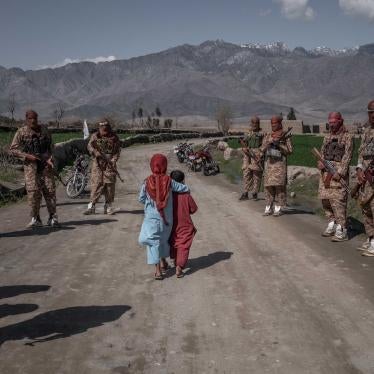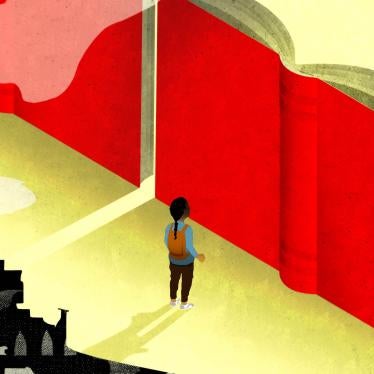(Jerusalem) - Israeli authorities should immediately lift restrictions that have left students in Gaza's public schools without textbooks and the most basic school supplies, such as notebooks and pens, Human Rights Watch said today. Israel severely limits imports into Gaza of a wide variety of basic goods, from food to construction materials.
More than a month into the school year, the Israeli restrictions have caused severe shortages that leave students unable to afford supplies such as notebooks. Students are obliged to share or take turns studying from used textbooks and workbooks. Some did not receive any books for this year's classes. Supplies smuggled through tunnels underneath Gaza's southern border with Egypt have failed to make up for the shortages caused by Israel's arbitrary restrictions on imports of educational materials.
"Israel's blockade affects every aspect of life in Gaza, and is even preventing students from having basic school supplies," said Sarah Leah Whitson, Middle East and North Africa director at Human Rights Watch. "What possible justification can there be for blocking school supplies, which effectively deprives children of their right to an education?"
Riyadh Lubbad, a principal at al-Karmel secondary school in Gaza City, told Human Rights Watch, "Some books from the curriculum were not printed due to the lack of ink and paper. It is particularly bad for history, geography, and English-language classes."
Salim Ayoub, an 11th-grade student at al-Karmel, said, "In our English class we have one book for every two students. When I get the workbook [with exercises] my classmate has the textbook, and we exchange them. Our class was lucky. Other English classes don't have books at all."
Ayoub said that students cannot afford notebooks: "There were no notebooks at all in the market at the beginning of school. Later, I found notebooks that came from the tunnels [from Egypt] but they were expensive. You're supposed to have three notebooks per subject, but I bought one or two."
Another 11th-grade student at al-Karmel, Mohamed Abu Karsh, said, "The curriculum needs about 20 notebooks. I only could afford to buy 10."
According to the United Nations, the armed conflict in Gaza last December and January destroyed 18 of Gaza's 641 schools, with a total of more than 440,000 students, and damaged 280 others. Because Israel has barred almost all shipments of construction materials, damaged schools have not been rebuilt or repaired, and 15,000 students whose schools were damaged during the war have been transferred to other schools. The UN Relief and Works Agency for Palestine Refugees (UNRWA) also had to cancel plans to build new schools because of the lack of construction materials.
Article 50 of the Fourth Geneva Convention concerning occupied territories requires the occupying power to "facilitate the proper working of all institutions devoted to the care and education of children."
Falah Lubbad is one of 20 or 30 Gaza importers who deal with stationery. "I used to get notebooks from a factory in Hebron, but we can't import from the West Bank now," he told Human Rights Watch. Notebooks smuggled from Egypt cost 70 percent more to import, he said, making them unaffordable for many students. "I didn't try to import through the tunnels because the notebooks are too expensive and poor quality, and many are torn when they arrive. I'm also out of pens, erasers, and stationery for university students." Lubbad said he was paying storage fees for 15 truckloads of stationery in Israel that had not been granted approval to enter Gaza; eight of the truckloads had been held up since September 2008.
Israel has allowed only two truckloads of stationery to enter Gaza in 2009, while nearly 120 truckloads of stationery were waiting for Israeli clearance to enter as of August 25, according to the UN's IRIN news agency. When the current school year began in late August, IRIN reported, public and private schools serving more than 240,000 students in Gaza lacked education materials. UNRWA schools have an additional 207,250 students.
Khaled Raddi, a spokesman for the Hamas education ministry, told Human Rights Watch that Gaza's schools faced a "severe shortage" of stationery, ink, and paper. UNRWA has been unable to print 10 percent of required textbooks because Israel has not approved the necessary ink and paper imports, Aidan O'Leary, an agency official who oversees school programs, told Human Rights Watch. Israel has also not approved imports of 5,000 school desks for UNRWA students, and 4,000 tables and chairs for teachers in classrooms.
"Because we don't have enough space for our students, we need to import portable container classrooms, but we are still waiting for them," O'Leary said. His agency has not been able to distribute stationery and pencils to students as planned, he said.
The United States, Israel's largest foreign donor, pledged US$300 million in humanitarian aid for Gaza in March at a donor's conference on post-war aid to Gaza in Egypt. US Secretary of State Hilary Clinton said at the conference, "A child growing up in Gaza without shelter, health care, or an education has the same right to go to school, see a doctor, and live with a roof over her head as a child growing up in your country or mine." In a letter to Clinton, Human Rights Watch called on the United States, as Israel's most important political, military and financial backer, to dissociate itself from the blockade and to speak out against it.
"Children in Gaza are suffering from punitive restrictions while the United States and other allies of Israel have failed to take a firm stand against this policy, prolonging the effects of the war," Whitson said.
Under international humanitarian law, Israel remains the occupying power in Gaza, even though it withdrew its permanent military forces and settlers in 2005, because it continues to exercise effective day-to-day control over most aspects of life in Gaza. In addition to its effective control over Gaza's land, air, and sea borders, Israel controls most of the territory's electricity, water, and sewage capacity, as well as its telecommunications networks and population registry.
Israel's blockade violates its duty as an occupying power to safeguard the basic health and welfare of the occupied population, a form of collective punishment against civilians in violation of international humanitarian law. The International Committee of the Red Cross, in its authoritative commentary on the Geneva Conventions, states that "[t]he concept of collective punishment must be understood in the broadest sense: it covers not only legal sentences but sanctions and harassment of any sort."






